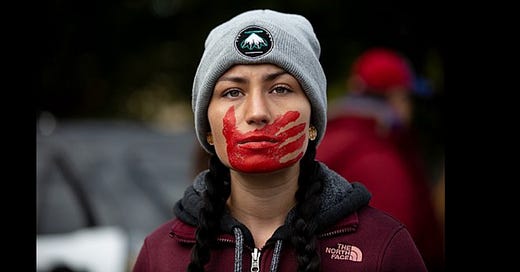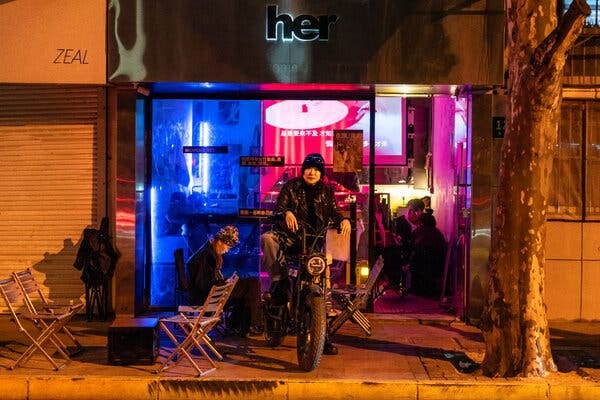Global Roundup: Canada Red Dress Day, Afghan Women Journalists, Iraqi LGBTQ+ Community, Lithuania’s First LGBTQ+ Eurovision Entrant, China Women’s Spaces
Curated by FG Contributor Samiha Hossain
Photo by Lorie Shaull (Wikimedia Commons)
For Alexis Albert of Oneida Nation of the Thames, Red Dress Day is an opportunity to educate people on the importance of breaking cycles of violence, while remembering the Indigenous women and girls whose lives were cut short as a result. It's a day to shed light on those who never received closure or justice, said Albert at an event.
This whole day is about raising awareness because society doesn't see us. When our Indigenous women go missing, it's their fault and they're not looked for. When our young people go missing, they're probably a runaway so there's no urgency. It's just not taken seriously and that needs to stop. We need to be seen and heard when our people go missing. -Alexis Albert
About 100 community members participated in a walk at the First Nation, south of London, Ontario, while wearing red t-shirts and face paint, holding up signs with the names and stories of their loved ones who never returned home. The homicide rate for Indigenous women and girls was six times higher than the rate for their non-Indigenous counterparts. They are also 12 times more likely to go missing or murdered.
Londoner Connie Patriquin from the Oneida Nation said the awareness is growing nationwide and she's hopeful that it'll create positive change for future generations, but for many First Nations, the wounds of losing their loved ones remain fresh.
It still touches your heart. It never goes away because there was never any resolution, it's like they were just thrown away, they were disposable and that's always going to be there. -Connie Patriquin
Violence against Indigenous women stems from colonization, said Albert, who runs the Oneida Family Healing Lodge, supporting families fleeing intimate partner violence, and uses a 'rebuilding families approach' to healing. Jessica George, 18, was front and centre at the walk in Oneida as she carried newspaper clippings detailing the murder of her cousin Theresa Wilson-Jamieson-Fleming, whose body was found in the Thames River, near Chatham in 2011 — one year after she vanished.
It's really scary you know, I feel like anyone can get taken and this can become a reality for any of us. -Jessica George
Zahra Joya has been living in London since her escape from the Taliban in August 2021. Photograph: Anselm Ebulue/The Guardian
Zahra Joya has been living in London in the UK since her escape from the Taliban in August 2021. Her family has been threatened and her team faces increasing risks in Afghanistan, but Joya knows she must keep reporting from exile.
In the three and a half years since she managed to board one of the last evacuation flights to leave Afghanistan after the seizure of power by Taliban militants, Rukhshana Media – the news agency Joya launched in 2020 to tell the stories of Afghan women and girls – has published hundreds of stories documenting the brutal assault on women’s rights under Taliban rule. Joya’s small team of reporters, all forced to work in secret, have written stories on the collapse of the healthcare system; girls being banned from the classroom; attacks on female artists, judges, police officers and activists; and increasing food shortages.
The Taliban just passed a law to stone and execute women in public again for adultery. There is no recourse to justice. They are denying millions of girls an education, an opportunity to work or to travel outside the house. They are trying to eradicate us completely. -Zahra Joya
Joya’s life is dominated by anxiety about the safety of the team of journalists reporting for Rukhshana from inside Afghanistan. A few months ago, a journalist was arrested by the Taliban and questioned on suspicion of working for Rukhshana. He was in prison for 11 days and only released when some elders from his province appealed to Taliban officials on his behalf. Since then he has left Afghanistan.
The future for Afghan media outlets such as Rukhshana operating in exile is increasingly uncertain. Like many diaspora Afghan media organisations, it has struggled to secure long-term funding to keep going. Rukhshana Media has now become a registered charity but Joya says that without long-term funding she has no idea how she is going to be able to keep paying her reporters and small editorial team and keep the website operational.
I try not to think about the future, to just keep going with the reporting and keep going for as long as we can. I cannot leave women and girls left there to suffer alone with their stories going untold. They deserve to be heard. -Zahra Joya
Image: Ameer Al-Mohammedawi/dpa/picture alliance
Social media has been the main platform of expression of any kind here, especially for those who do not have their own spaces. That includes vulnerable groups, such as the LGBTQ+ community, disabled people and others. Social media was a way for these people to express themselves, connect and create communities. -Ayaz Shalal Kado, executive director of IraQueer
While social media and digital platforms have offered an opportunity, they have also posed a danger, Human Rights Watch said earlier this year as it launched the campaign Secure Our Socials. Working with local rights groups, Human Rights Watch reported how digital activity was being used by authoritarian states against individuals suspected of being queer. This danger is now likely to increase for the LGBTQ+ community in Iraq.
Despite generally negative attitudes toward same-sex relationships, Iraq never had a law explicitly criminalizing them. Instead, Iraqi officials used more vague anti-obscenity laws to punish and harass members of the LGBTQ+ community. But in late April, the Iraqi government amended a pre-existing law on prostitution. The new amendments ban any sort of homosexuality or transsexuality. Anybody seen to "promote" homosexuality could be fined up to 15 million Iraqi dinars ($11,220/€10,5050) or sentenced to jail for up to seven years.
Iraqi NGOs are still working out exactly how to respond. One Iraqi rights organization, Gala for LGBTQ, posted advice on its Instagram page that included telling users to make their accounts private, unfollowing openly queer accounts and deleting digital material that could be seen as LGBTQ+-friendly.
Kado does worry that the online presence of Iraq's LGBTQ+ community is about to be reduced or even disappear altogether, as locals realize the dangers of using social media. But, he added, there are even larger ramifications around freedom of expression in Iraq.
Banning words like 'homosexual' or 'gender' is a huge step backwards — and not just for queer people. It's intersectional. It doesn't just affect my organization, but also all feminist organizations, all those who work for women's rights, and those who focus on gender and bodily rights in general. -Ayaz Shalal Kado
(Eurovision/EBU/Sarah Louise Bennett)
This year, singer-songwriter Silvester Belt is making history as the first LGBTQ+ artist to represent Lithuania at the Eurovision Song Contest. At 26 years old, he’s had an impressive career so far: aged just 12, he became a finalist in Lithuania’s preselection for the Junior Eurovision Song Contest in 2010. He’s starred in reality contests, including the Lithuanian version of The X Factor, and won music show Aš – superhitas in 2017.
Belt’s song, hypnotic eurobanger “Luktelk”, has hit over five million Spotify streams worldwide. In Lithuania, it hit number on the charts and stayed there for several weeks. It’s a huge feat for any artist in the country – but particularly for a bisexual one.
[LGBTQ+ representation in Lithuania’s music scene is] Zero. It’s nada. It’s non-existent. Everyone is pretending to be what they’re not, and it pisses me off so much. -Silvester Belt
While Eurovision has championed LGBTQ+ artists for decades, Lithuania has never sent an out one to the contest. In Belt’s view, there is a culture of fear among Lithuanian artists about being seen as LGBTQ+, as they feel there is “so much at stake” and that they could “lose [their] career” if they were to ever come out. Same-sex marriage is illegal in the country, while a 2020 survey found that six in ten LGBTQ+ people are never open about their identity.
Belt struggled with homophobia at school and admits he used to “hate” himself because of his sexuality, but he was out and “comfortable” with being LGBTQ+ before his first adult TV appearance. He didn’t have to contend with coming out in the same way some stars with a platform might have to. Belt doesn’t want to be a poster child for LGBTQ+ representation in Lithuania. That’s not why he wanted to go to Eurovision: “I don’t even know why I decided to do this,” he quips. But he knows the power he has for those queer people in the country who don’t see themselves often in the media, or aren’t able to be seen themselves.
As much as I’m probably gonna trigger a lot of people with just my being, I feel like at the same time, it is a big thing for the rest of us. If I had someone like that growing up, I feel like it would have helped me not feel so shit. At least it will bring up a discussion about it. -Silvester Belt
Du Wen at Her, the bar she started last year, in Shanghai. “I think everyone living in this city seems to have reached this stage that they want to explore more about the power of women,” she said. Credit...Qilai Shen for The New York Times
Women in Shanghai, and some of China’s other biggest cities, are negotiating the fragile terms of public expression at a politically precarious moment. China’s ruling Communist Party has identified feminism as a threat to its authority. Women’s rights activists have been jailed. Concerns about harassment and violence against women are ignored or outright silenced.
Frustrated by the increasingly narrow understanding of women by the public, Nong He, a film and theater student, held a screening of three documentaries about women by female Chinese directors.
I think we should have a broader space for women to create. We hope to organize such an event to let people know what our life is like, what the life of other women is like, and with that understanding, we can connect and provide some help to each other. -Nong He
Tang Shuang is the owner of Paper Moon, which sells books by female authors. The bookstore is divided into an academic section that features feminist history and social studies, as well as literature and poetry. There is also an area for biographies. Anxiety about attracting the wrong kind of attention is always present. When Shuang opened her store, she placed a sign in the door describing it as a feminist bookstore that welcomed all genders, as well as pets – which her friend advised her to remove.
Wang Xia, the owner of Xin Chao Bookstore, has chosen to stay away from the “F” word altogether. Instead she described her bookstore as “woman-themed.” When she opened it in 2020, the store was a sprawling space with nooks to foster private conversations and six study rooms named after famous female authors like Simone de Beauvoir. Xin Chao Bookstore served more than 50,000 people through events, workshops and online lectures.
Empowering women is at the heart of Du Wen’s motivation. She was jolted into action by the isolation of the pandemic: For years she dreamed of opening a place where she could elevate the voices of women, and now it seemed more urgent than ever. After the lockdown, she opened Her, a place where women could strike friendships and debate the social expectations that society had placed on them. On International Women’s Day in March, Her held an event called “Marry Me,” in which women took vows to themselves. The bar has also hosted a salon where women acted out the roles of mothers and daughters. Many younger women described a reluctance to be treated the way their mothers were treated and said they did not know how to talk to them, Wen said.
Samiha Hossain (she/her) is an aspiring urban planner studying at Toronto Metropolitan University. Throughout the years, she has worked in nonprofits with survivors of sexual violence and youth. Samiha firmly believes in the power of connecting with people and listening to their stories to create solidarity and heal as a community. She loves learning about the diverse forms of feminist resistance around the world.








